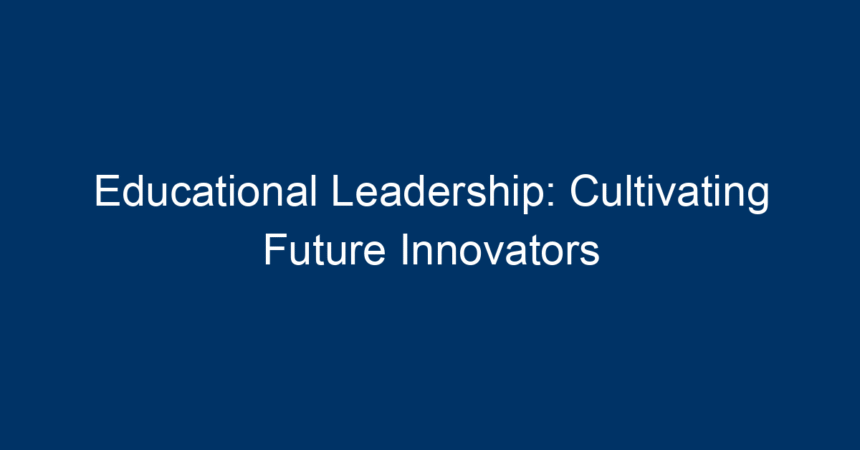In an ever-evolving world, the role of educational leadership transcends traditional boundaries. Today, leaders in education are not just responsible for administrative tasks but are pivotal in cultivating the innovators of tomorrow. The expectations of educators and leaders are constantly shifting, requiring a new lens through which to view teaching, learning, and leadership. This article explores how effective educational leadership can empower educators and students alike, fostering an environment ripe for innovation and growth.
Understanding Educational Leadership
Definition and Importance
Educational leadership can be defined as the process of influencing and guiding individuals and groups in educational institutions to improve practices and outcomes. It encompasses various aspects, including curriculum development, teacher mentoring, community engagement, and policy-making. Strong educational leaders are not just managers; they are visionaries who inspire change and drive progress.
The Role of Educational Leaders
Educational leaders play multiple roles, including:
- Visionary: They create and communicate a clear vision for the educational institution.
- Mentor: They provide support and guidance to teachers and staff, helping them grow professionally.
- Innovator: They encourage the exploration of new ideas and methods in teaching and learning.
- Collaborator: They foster relationships among stakeholders, including students, parents, and the community.
By understanding these roles, educational leaders can better facilitate an environment conducive to innovation.
Cultivating a Culture of Innovation
Emphasizing Collaboration
One of the key components of effective educational leadership is the ability to foster collaboration among educators. When teachers collaborate, they share best practices, resources, and ideas, which can lead to innovative approaches in the classroom. Educational leaders can promote collaboration by:
- Encouraging team-teaching efforts and interdisciplinary projects.
- Organizing professional development workshops that emphasize cooperative learning.
- Creating systems for regular feedback and discussion among teachers.
Encouraging Risk-Taking
Innovation thrives in environments where individuals feel safe to take risks. Educational leaders should cultivate a culture that embraces failure as a learning opportunity. This includes:
- Providing resources and support for experimental teaching methods.
- Celebrating innovative attempts, even if they don’t yield immediate results.
- Offering professional development geared toward creative problem-solving.
Integrating Technology
Technology is a powerful tool in today’s educational landscape. Educational leaders must encourage the integration of technology in various forms, focusing on:
- Digital tools that enhance learning and teaching.
- Distance learning options that expand access to education.
- Data analytics to measure student progress and tailor instruction.
Through the effective use of technology, leaders can facilitate innovative practices that resonate with 21st-century learners.
Empowering Educators
Professional Development
To inspire innovation, educational leaders must invest in the professional growth of their teachers. Ongoing professional development should include:
- Workshops on the latest teaching methodologies.
- Training on how to utilize technology effectively in the classroom.
- Leadership development programs that prepare teachers for future leadership roles.
By prioritizing professional development, educational leaders equip teachers with the knowledge and skills to become innovators in their classrooms.
Creating a Supportive Environment
A supportive environment enhances educators’ capacity to innovate. Leaders should focus on:
- Establishing mentorship programs where experienced teachers guide novice teachers.
- Implementing systems for regular check-ins and constructive feedback.
- Providing mental health resources to support teachers’ well-being.
When educators feel supported, they are more likely to take risks and innovate in their teaching practices.
Engaging Students in the Innovation Process
Student-Centered Learning
Educators should shift from traditional teaching methods to student-centered approaches that promote engagement and creativity. Educational leadership plays a crucial role in this transformation by:
- Encouraging project-based learning that allows students to explore their interests.
- Fostering inquiry-based learning where students take charge of their education.
- Implementing experiential learning opportunities that connect classroom knowledge to real-world applications.
By placing students at the center of the learning process, educational leaders help cultivate the skills necessary for future innovation.
Fostering Critical Thinking and Problem-Solving
Educational leadership must prioritize the development of critical thinking and problem-solving skills among students. Leaders can achieve this by:
- Integrating STEM (Science, Technology, Engineering, and Mathematics) curricula that encourage analytical thinking.
- Promoting activities that require collaboration and creative solutions.
- Ensuring access to resources and environments that challenge students to think critically.
Empowering students to tackle real-world problems equips them with the skills needed to become tomorrow’s innovators.
Building Strong Community Partnerships
Engaging Stakeholders
Educational leaders should seek to build strong partnerships with parents, businesses, and local organizations. These partnerships can enhance educational experiences and opportunities for students. Strategies for engagement include:
- Hosting community forums to discuss educational needs and aspirations.
- Collaborating with local businesses to create internships and job-shadowing opportunities.
- Involving parents in school activities and decision-making processes.
By establishing strong community ties, educational leaders can foster an ecosystem that nurtures innovation.
Utilizing Community Resources
Local resources can provide invaluable support for schools. Leaders should actively seek out and utilize community resources such as:
- Libraries, museums, and technology centers that offer educational programs.
- Local experts who can serve as guest speakers or mentors for students.
- Non-profit organizations that focus on educational initiatives.
Collaborating with community resources enriches the educational environment and promotes innovative practices.
Conclusion: Actionable Insights for Educational Leaders
To effectively cultivate future innovators, educational leaders must embrace their multifaceted roles. By focusing on collaboration, encouraging risk-taking, integrating technology, empowering educators, engaging students, and building community partnerships, they can create an environment rich in innovation.
Actionable Strategies:
-
Implement Collaborative Practices: Regularly schedule time for teacher collaboration and discussions on innovative teaching strategies.
-
Encourage Experimentation: Foster a culture where educators feel comfortable trying new approaches, understanding that failure is a part of the learning process.
-
Invest in Professional Development: Provide ongoing training opportunities tailored to educators’ needs, focusing on new technologies and teaching methodologies.
-
Bring Students into the Call to Innovate: Create student-led initiatives and projects that allow them to influence their learning environment.
- Forge Community Alliances: Actively seek out partnerships that can provide additional support and resources for students and teachers.
By implementing these strategies, educational leaders can generate a ripple effect, nurturing future innovators who will contribute to a brighter, more innovative world. In doing so, they affirm their crucial role in shaping future generations.




